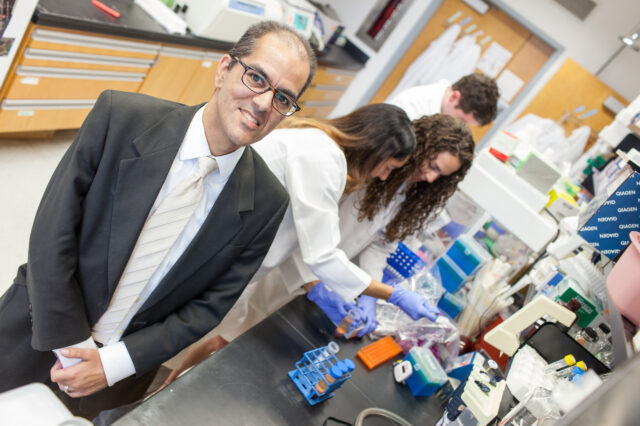University of Florida Health Researcher Combines DNA Sequencing and Cloud Computing to Match Novel Treatments and Leukemia Patients

The University of Florida Health Cancer Center collaborated with the Oregon Health and Sciences University and dozens of other academic medical centers across the country to evaluated genomic abnormalities in acute myeloid leukemia at a depth that has illuminated new therapeutic strategies.
Christopher Cogle, MD, a physician-scientist in the Division of Hematology and Oncology of the University of Florida Department of Medicine, was an author of a groundbreaking study published in Nature in October 2018, in which researchers generated a large dataset that can be leveraged to address clinical, genomic, transcriptomic, and functional analysis of the biology of AML. According to Dr. Cogle, “This study started with a deep curiosity about leukemia and ended with major discoveries about the underpinnings of leukemia that led us to develop new treatment strategies for our patients.”
About 21,000 people are diagnosed with AML in the United States each year, and about 10,000 die from the disease. It is a heterogeneous disorder, with several genetic classes, multiple cellular subtypes, and nearly 2,000 somatically mutated genes discovered thus far. These complex mutational patterns within and across patients make the implementation of targeted therapies challenging. Despite extensive research efforts, few new therapies have been developed, and the standard of care has remained largely unchanged for the past 30-40 years.
The project described in the Nature publication evaluated a total of 672 specimens from 662 patients from the Beat AML initiative. By conducting exome sequencing, RNA sequencing, and ex vivo drug sensitivity, the group identified both mutations in genes not previously associated in AML patients and novel correlations between gene signatures and drug responses. Furthermore, the integration of these datasets has revealed new markers and mechanisms of drug sensitivity and resistance to explore.
The data have been released to the public, and can be accessed via Vizome, a new online viewer. Thus, the dataset combines two of the greatest advances in society in recent decades, DNA sequencing and cloud computing, Cogle describes. While each of these technologies have much to offer on their own, the combination is more powerful in the manner in which it illuminates novel pathway in which to pursue new treatment options for patients with leukemia.
Precision medicine, and more specifically precision oncology, aims to tailor cancer therapy to individual patients. However, oncology drug trials frequently fail because the “wrong” patients—i.e., those with unidentified, yet incorrectly matched, genetic and molecular disease characteristics—are enrolled. This new dataset allows smarter design of clinical trials by employing “precision recruiting” to better match patients and drugs. These large data sets require the coordination of efforts of investigators across the country and enrolment of large number of patients.
Dr. Cogle concludes, “The results of this study flip precision oncology around; in addition to finding the right drug for the patient, these discoveries enable us to find the right patient for the drug.”
Reference
Tyner JW, Tognon CE, Bottomly D, et al. Functional genomic landscape of acute myeloid leukemia. Nature. 2018;562(7728):526-531.